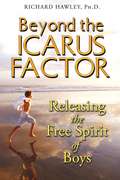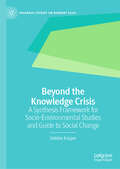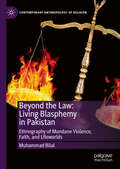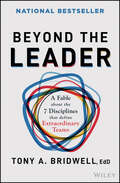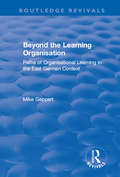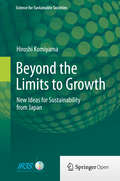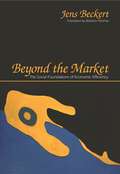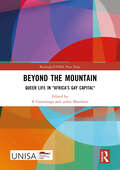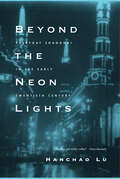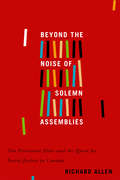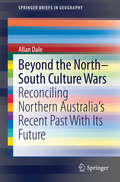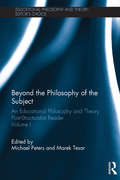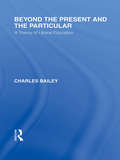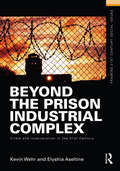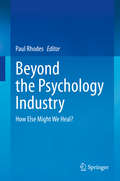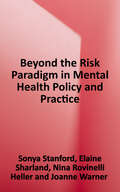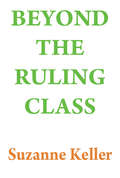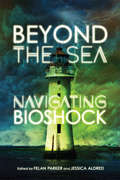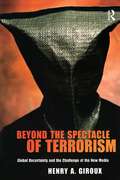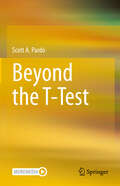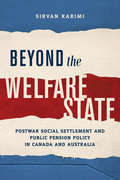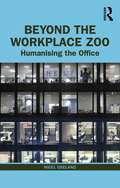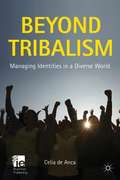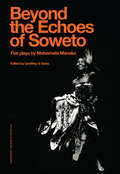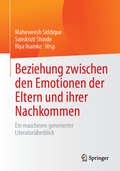- Table View
- List View
Beyond the Icarus Factor: Releasing the Free Spirit of Boys
by Richard HawleyA call to reconsider the place of boys in the family, schools, and community institutions that rob them of their inborn vitality and creativity • Argues that boys have a unique free-spirit nature and that efforts to alter or suppress it lead to profound unhappiness, pathology, or startling compulsions • Demands another approach to societal expectations, one that values and promotes the daring creativity of boys Richard Hawley’s many years as headmaster of a boys’ school have convinced him that boys do indeed have a unique, intrinsic, and inalienable free-spirit nature. He sees deep flaws in the way we--as parents, educators, and community members--alter or suppress that true nature in order to turn boys into men that fit our societal template. Hawley argues that the “model man” in our society, while seemingly successful in his role, may yet be unhappy in his life. The very elements that we strip away from a boy’s natural tendencies are the sources of spirituality and vitality that can give his life both meaning and satisfaction. Without these, he is lost to his essential nature.A new approach is needed, says Hawley, and he goes to the roots of Western theology and philosophy to locate what has gone wrong and how those consequences might be addressed. He sounds the clarion call to unleash, promote, and celebrate the seemingly dangerous pursuits that reflect the creativity and daring nature of boys. Fantasy and imagination must trump cognition and problem solving. We must not hold our boys back with our fears of failure but give them the tools and support they need to create wings good enough to fly wherever they wish to go.
Beyond the Knowledge Crisis: A Synthesis Framework for Socio-Environmental Studies and Guide to Social Change (Palgrave Studies on Norbert Elias)
by Debbie KasperIn the face of complex, interwoven, planet-scale problems, many cite the need for more integrated knowledge—especially across the natural and social sciences. Excessive specialization, they argue, gets in the way of knowing what we know, much less being able to use it to address urgent socio-environmental crises. These concerns, it turns out, go back centuries. This book picks up where most leave off, exploring the history of how we got here and proposing a way forward. Along the way, readers find that the synthesis long called for depends on theoretical advancements in social science. Fortunately, the author argues, we have everything we need to achieve those advancements, thanks largely to the contributions of Norbert Elias. Integrating his insights with history, science, sociological theory, and more, this book neatly packages the upgraded paradigm we need to be able to meaningfully address complex socio-environmental problems and more intentionally shape humanity’s collective future.
Beyond the Law: Ethnography of Mundane Violence, Faith, and Lifeworlds (Contemporary Anthropology of Religion)
by Muhammad BilalThe book embarks on a journey into the intricate landscape of blasphemy in Pakistan amid a rising tide of blasphemy accusations, public lynchings, and contentious blasphemy laws. Challenging conventional perspectives, this book delves beyond legal and religious confines, offering an ethnography of the mundane as a secular reading and a grand existential scheme to highlight how blasphemy laws and religious prisms often fail to capture the essence of the blasphemy dilemma in Pakistan. The author offers an insightful re-evaluation of the blasphemy issue, addressing its multifaceted definition, the motivations driving intentional blasphemous acts and frivolous accusations, the authority to punish alleged offenders, the paradox of religious violence, and the emergence of mediated expressions and virtual negotiation of blasphemy. Through meticulous grassroots analysis of ordinary Pakistanis’ perspectives, the book offers pragmatic policy solutions for blasphemy issues, presenting unorthodox insights into Pakistan, its diverse populace, and the ever-evolving sensibilities of Islam and societal dynamics in both local and global contexts.
Beyond the Leader: A Fable About the 7 Disciplines That Define Extraordinary Teams
by Tony A. BridwellAn exciting and effective new approach for leadership in all manner of settings In Beyond the Leader, renowned organizational behaviorist and author Dr. Tony Bridwell delivers a startlingly insightful new take on leadership and followership. The author explains how the interplay of these two dynamics can optimize team performance. In the book, Bridwell introduces seven disciplines that elevate teams from mere efficacy to a state of continuous learning and improvement, innovation, and long-term success. Bridwell describes the journey of a young man named Thomas, a first-time leader, as he meets and learns from Leah, a seasoned executive turned business professor. Under Leah's patient mentorship, Thomas learns how to embed learning, accountability, and adaptability into his team. Beyond the Leader also explores: How to apply the book's lessons to commercial organizations, families, communities, and other groups Practical insights and best practices for research-based, effective leadership that motivates all kinds of people Strategies for optimizing your team's behavior to create sustainable, high-performance organizations Perfect for managers, executives, and other business leaders, Beyond the Leader is also a must-read for anyone interested in improving their own ability to lead, motivate, and inspire the people around them—personally, professionally, and organizationally.
Beyond the Learning Organisation: Paths of Organisational Learning in the East German Context (Routledge Revivals)
by Mike GeppertThis title was first published in 2000. In contemporary management literature, the idea that managers and organizations should learn and provide widespread capabilities for learning to learn is gaining popularity. Some see reflexive thinking and learning as being the proper response to the transformation of industrial society. However, this study is not concerned too much with the reasons for learning, but is more about how actors and groups of actors actually learn and the resources at their disposal for learning. The study aims to show that differences in social context do matter, and analyzes the organizational learning process in the political and social transformation of East Germany.
Beyond the Limits to Growth: New Ideas for Sustainability from Japan (Science for Sustainable Societies)
by Hiroshi KomiyamaAt a time when contemporary challenges seem to many to be insurmountable, this book offers an optimistic view of the future and provides a road map for societies to get there. Drawing upon extensive research and many years as a thought leader in environmental and sustainability issues in Japan and internationally, Hiroshi Komiyama analyzes the most pressing challenges to the attainment of sustainability of economically advanced nations and argues forcefully for Japan to lead them out of the present dilemma through active promotion of creative consumer and societal demand. He shows how an active industry-government-academic partnership can provide the environment needed to promote such new creative demand and illustrates its potential through presentation of a Platinum Society Network that was launched on a regional basis in Japan in 2010 to facilitate the solution of common issues through the exchange of information and ideas. What is perhaps most surprising about the text is its unwavering optimism supported by hard evidence, history, and insightful observation. Problems arising from new paradigms of the 21st century (what the author refers to as "exploding knowledge, limited Earth resources, and aging societies") thwart sustainable development in advanced and developing countries alike. All countries will struggle with issues that evolve from these paradigms including diminishing resources, expanding budget deficits, and growing global environmental problems. This window on potential practical pathways and solutions should be of interest to all those engaged in seeking ways to meet these contemporary challenges.
Beyond the Market: The Social Foundations of Economic Efficiency
by Jens BeckertBeyond the Market launches a sociological investigation into economic efficiency. Prevailing economic theory, which explains efficiency using formalized rational choice models, often simplifies human behavior to the point of distortion. Jens Beckert finds such theory to be particularly weak in explaining such crucial forms of economic behavior as cooperation, innovation, and action under conditions of uncertainty--phenomena he identifies as the proper starting point for a sociology of economic action. Beckert levels an enlightened critique at neoclassical economics, arguing that understanding efficiency requires looking well beyond the market to the social, cultural, political, and cognitive factors that influence the coordination of economic action. Beckert searches social theory for the components of an alternative theory of action, one that accounts for the social embedding of economic behavior. In Durkheim and Parsons he finds especially useful approaches to cooperation; in Luhmann, a way to understand how people act under highly contingent conditions; and in Giddens, an understanding of creative action and innovation. Together, these provide building blocks for a research program that will yield a theoretically sophisticated understanding of how economic processes are coordinated and the ways that markets are embedded in social, cultural, and cognitive structures. Containing one of the most fully informed critiques of the neoclassical analysis of economic efficiency--as well as one of the most thoughtful blueprints for economic sociology--this book reclaims for sociology the study of one of the most important arenas of human action.
Beyond the Mountain: Queer Life in "Africa’s Gay Capital" (Routledge/UNISA Press Series)
by B Camminga Zethu MatebeniBeyond The Mountain: Queer Life in "Africa’s Gay Capital" contributes to the body of knowledge on the lived experiences of lesbian, gay, bisexual, transgender, queer, and intersex (LGBTQI) communities in Cape Town. The book provides insight on the lives of the LGBTQI communities in Cape Town and challenges the stereotypes and prejudices against these communities. The chapters consist of both narratives of lived experiences and academic discussions presented by novice as well as experienced scholars. The imagery of beyond the mountain is a depiction of the lives of LGBTQI community and immovable negative perceptions the general public have to them and seeks to expose their world and the kinds of violence and abuse they are subjected to, as well as unveiling the racial discrimination within these communities. The book revolves around five themes: education, emancipation, protection, acceptance, and integration of those who identify as LGBTQI people in society.
Beyond the Neon Lights: Everyday Shanghai in the Early Twentieth Century
by Hanchao LuHow did ordinary people live through the extraordinary changes that have swept across modern China? How did peasants transform themselves into urbanites? How did the citizens of Shanghai cope with the epic upheavals—revolution, war, and again revolution—that shook their lives? Even after decades of scholarship devoted to modern Chinese history, our understanding of the daily lives of the common people of China remains sketchy and incomplete. In this carefully researched study, Hanchao Lu weaves rich documentary data with ethnographic surveys and interviews to reconstruct the fabric of everyday life in China's largest and most complex city in the first half of this century.
Beyond the Noise of Solemn Assemblies: The Protestant Ethic and the Quest for Social Justice in Canada (McGill-Queen's Studies in the History of Religion #82)
by Richard AllenSince the 1970s Richard Allen's scholarship on the social gospel has broken new ground in the field of Canadian social and religious history by recovering key aspects of the tradition and its contribution to reform movements and politics. Beyond the Noise of Solemn Assemblies collects and extends many of his classic works to present a comprehensive overview of a major thread in the fabric of the country. Observing the mutual foundations of political and religious traditions in myth and arguing that the sacred and the secular belong together in discussions of public affairs, Allen contests the view that religion is personal and isolated from the public square. He discusses a range of topics: the transition from providential to progressive thought in nineteenth-century Canada; the new spirituality of social solidarity articulated by Winnipeg college students in the 1890s; the role of the social gospel in pioneering urban reform; farmers and workers finding in radical Christianity legitimation for political revolt; Christian intellectuals in the 1930s framing a revolutionary prospectus for Depression-era Canada; the significance of Norman Bethune's religious upbringing for his life and work; strategically focused post-war ecumenical coalitions like Project North and the Latin American Working Group; and the prospects for democratic socialism at the end of the Cold War. Opening with a chapter relating the author's upbringing in a ministerial household dedicated to the Protestant ethic as the spirit of socialism, Beyond the Noise of Solemn Assemblies represents a significant contribution to understanding the social Christian movement in Canada.
Beyond the North-South Culture Wars: Reconciling Northern Australia's Recent Past With Its Future (SpringerBriefs in Geography)
by Allan DaleIncreasingly, Australia's agriculturalists are looking to the nation's north to escape the decline in southern Australia's water and soil resources. Booming mineral and gas development is also helping to drive the nation's economic success. At the same time, the south's conservation sector would like to see much of the north preserved as iconic wilderness. Both conservation and resource development interests alike are often at odds with the interests of the north's traditional owners, many of whom remain trapped in welfare dependency and poverty. Indeed, to the ire of north Australians, the past five decades of north Australian history have indeed been characterized by these national-scale conflicts being played out in regional and local communities. This book explores these conflicts as well as the many emerging opportunities facing the development of the north, suggesting that a strong cultural divide between northern and southern Australia exists; one that needs to be reconciled if the nation as a whole is to benefit from northern development. The author first explores where these historical conflicts could take us without a clear forward agenda. A story-based personal narrative from his long and diverse experience in the north gives life to these themes. Finally, the book then draws on these stories to help shape a cohesive agenda for the north's future.
Beyond the Philosophy of the Subject: An Educational Philosophy and Theory Post-Structuralist Reader, Volume I (Educational Philosophy and Theory: Editor’s Choice)
by Michael A Peters Marek TesarThis first volume focuses on a collection of texts from the latter twenty years of Educational Philosophy and Theory, selected for their critical status as turning points or important awakenings in post-structural theory. In the last twenty years, the applications of the postmodern and poststructuralist perspectives have become less mono-focused, less narrowly concerned with technical questions and also less interested in epistemology, and more interested in ethics. This book covers questions of genealogy, ontology, the body and the institution, giving examples of theoretical applications of post-structural theory that testify to the generative and endlessly applicable potential of this work to different fields and avenues of thought. While informed by Foucault's thinking of the political subjugation of docile bodies to individuals as self-determining beings, the chapters in this book culminate in amalgamations of different schools of educational philosophy, which explore poststructuralist approaches to education. Beyond the Philosophy of the Subject will be key reading for academics, researchers and postgraduate students in the fields of philosophy of education, philosophy, education, educational theory, post-structural theory, the policy and politics of education, and the pedagogy of education.
Beyond the Present and the Particular (International Library of the Philosophy of Education Volume 2): A Theory of Liberal Education
by Charles H. BaileyCharles Bailey advances a modern characterization and justification of liberal education and defends such a view of liberal education against contemporary challenges. The book will be of special value to those guiding educational policy, designing curricula and reflecting on their own teaching practice. An introductory part of the book describes the need for justification and the special nature of liberal education as compared with other characterizations of education in utilitarian terms. The author offers a positive account of the content of liberal education, after a consideration and critique of the work of Paul Hirst, Philip Phenix and John White and follows this with an account of teacher strategy, attitude and methodology appropriate to liberal education. The final part of the book describes contemporary trends and challenges to the idea of liberal education and shows how they fail to provide a coherent alternative to liberal education as a basis for universal compulsory education.
Beyond the Prison Industrial Complex: Crime and Incarceration in the 21st Century (Framing 21st Century Social Issues)
by Kevin Wehr Elyshia AseltineThis short text, ideal for Social Problems and Criminal Justice courses, examines the American prison system, its conditions, and its impact on society. Wehr and Aseltine define the prison industrial complex and explain how the current prison system is a contemporary social problem. They conclude by using California as a case study, and propose alternatives and alterations to the prison system.
Beyond the Psychology Industry: How Else Might We Heal?
by Paul RhodesThis book provides a scholarly yet accessible approach to critical psychology, specifically discussing therapeutic practices that are possible outside of the mainstream psychology industry. While there are many books that deconstruct or dismantle clinical psychology, few provide a compendium of potential alternatives to mainstream practice. Focusing on five main themes in reference to this objective: suffering, decolonization, dialogue, feminism and the arts, these pages explore types of personal inquiry, cultural knowledge or community action that might help explain and heal psychological pain beyond the confines of the therapy room. Chapters focus on the role of cultural knowledge, including spiritual traditions, relational being, art, poetry, feminism and indigenous systems in promoting healing and on community-based-initiatives, including open dialogue, justice-based collaboration and social prescribing. Beyond the Psychology Industry will be of interest to researchers, clinical psychologists, therapists, academics in mental health, and cultural psychologists.
Beyond the Risk Paradigm in Mental Health Policy and Practice
by Sonya Stanford Elaine Sharland Nina Rovinelli Heller Joanne WarnerModern society is increasingly preoccupied with fears for the future and the idea of preventing 'the worst'. The result is a focus on attempting to calculate the probabilities of adverse events occurring - in other words, on measuring risk. Since the 1990s, the idea of risk has come to dominate policy and practice in mental health across the USA, Australasia and Europe. In this timely new text, a group of international experts examines the ways in which the narrow focus on specific kinds of risk, such as violence towards others, perpetuates the social disadvantages experienced by mental health service users whilst, at the same time, ignoring the vast array of risks experienced by the service users themselves. Benefitting from the authors' extensive practice experience, the book considers how the dominance of the risk paradigm generates dilemmas for mental health organizations, as well as within leadership and direct practice roles, and offers practical resolutions to these dilemmas that both satisfy professional ethics and improve the experience of the service user. Combining examination of key theories and concepts with insights from front-line practice, this latest addition to Palgrave's Beyond the Risk Paradigm series provides an important new dimension to debates on mental health provision.
Beyond the Ruling Class: Strategic Elites in Modern Society
by Suzanne KellerInfluential minorities have existed in some form in all human societies. Throughout history, such elites have evoked varied responses--respeet. hos-tility, fear. envy, imitation, but never indifference. While certain elite groups have been of only passing historical importance, strategic elites, whose mem-bers are national and international leaders, today are ultimately responsible for the realization of social goals and for the continuity of the social order in a swiftly changing world. This volume, which first appeared in 1963, markeda major advance in our theoretical understanding of these elites, why they are needed, how they operate, and what effect they have on society. Drawing upon the work of such classical writers as Saint-Simon. Marx. Durkheim. Mosca. Pareto. and Michels, and such modern scholars as Mann-heim. Lasswell, Aron. Mills, and Parsons, the author presents a challenging theory of elites that provides the framework for her examination of their co-existence, their social origins, and their rise and decline. The elites discussed here include political, diplomatic, economic, and military, as well as scientific, cultural, and religious ones. Systematically, the author surveys available em-pirical data concerning American society, and selected materials on Great Brit-ain. Germany, the Soviet Union, and the developing nations of Asia and Africa. Written with clarity and distinction. Beyond the Ruling Class remains a thorough and provocative treatment, rich in empirical insights, of a subject that will compel the attention of political scientists, sociologists, and historians concerned with themes of power, influence, and leadership in national and international life. Her new introduction to Beyond the Ruling Class is at once an appraisal of the current status of elite studies and a careful self-evaluation of her efforts.
Beyond the Sea: Navigating Bioshock
by Felan Parker Jessica AldredThe Bioshock series looms large in the industry and culture of video games for its ambitious incorporation of high-minded philosophical questions and retro-futuristic aesthetics into the ultraviolent first-person shooter genre. Beyond the Sea marks ten years since the release of the original game with an interdisciplinary collection of essays on Bioshock, Bioshock 2, and Bioshock Infinite. <p><p> Simultaneously lauded as landmarks in the artistic growth of the medium and criticized for their compromised vision and politics, the Bioshock games have been the subject of significant scholarly and critical discussion. Moving past well-trodden debates, Beyond the Sea broadens the conversation by putting video games in dialogue with a diverse range of other disciplines and cultural forms, from parenting psychology to post-humanism, from Thomas Pynchon to German expressionist cinema. <p> Offering bold new perspectives on a canonical series, Beyond the Sea is a timely contribution to our understanding of the aesthetics, the industry, and the culture of video games. <p> Contributors include Daniel Ante-Contreras (Miracosta), Luke Arnott (Western Ontario), Betsy Brey (Waterloo), Patrick Brown (Iowa), Michael Fuchs (Graz), Jamie Henthorn (Catawba), Brendan Keogh (Queensland), Cameron Kunzelman (Georgia), Cody Mejeur (Michigan State), Matthew Thomas Payne (Notre Dame), Gareth Schott (Waikato), Karen Schrier (Marist), Sarah Stang (York/Ryerson), Sarah Thorne (Carleton), John Vanderhoef (California State, Dominguez Hills), Matthew Wysocki (Flagler), Jordan R. Youngblood (Eastern Connecticut State), and Sarah Zaidan (Emerson).
Beyond the Spectacle of Terrorism: Global Uncertainty and the Challenge of the New Media
by Henry A. Giroux"Henry Giroux's essay awakens us to the ways new media proliferate and circulate images and ideas of terror that order our lives, pervert our pedagogy, delimit our democracy. Recommended reading for anyone who wants to comprehend our times, our politics, our possibilities." --David Theo Goldberg, University of California, Irvine "Henry Giroux is one of the sharpest cultural critics today. His new book is an important intervention on media and spectacles. It shows us the depth of the dark side, only to conclude that the same media may be deployed in recovery against the social fragmentation caused by fear and consumerism, which is essential to bringing the country back to the path of decency and justice." --Arif Dirlik, University of Oregon Prominent social critic Henry Giroux explores how new forms of media are challenging the very nature of politics in his most poignant and striking book to date. The emergence of the spectacle of terror as a new form of politics raises important questions about how fear and anxiety can be marketed, how terrorism can be used to recruit people in support of authoritarian causes, and how the spectacle of terrorism works in an age of injustices, deep insecurities, disembodied social relations, fragmented communities, and a growing militarization of everyday life. At the same time, the new media such as the Internet, digital camcorders, and cell phones can be used to energize sites of resistance, provide alternative public spheres, pluralize political struggles, and expand rather than close down democratic relations. Giroux considers what conditions and changes are necessary to reinvigorate democracy in light of these new challenges. Radical Imagination Series
Beyond the T-Test
by Scott A. PardoThis book was inspired by years of questions asked by non-statistical professionals, from social scientists, public policy analysts, regulatory affairs specialists, engineers, and physical scientists. It provides them with both an intuitive explanation of many common statistical methods and enough mathematical background to help them justify those methods to others, such as regulatory agencies. It provides an introduction to commonly used methods that are not covered in a first elementary statistics course, such as partial least squares, MCMC, and neural networks. It also provides R code for making all the computations described in the text. As a textbook, it could be used as a second course in statistics for non-statisticians, in fields such as social sciences, public policy, engineering, chemistry, and physics. Many first-year graduate students have had an elementary statistics course, but were not exposed to enough of the mathematics to justify the application of those methods. Furthermore, they often encounter methods and concepts not touched upon in their first statistics course. This book provides the tools required to give a deeper understanding of statistical methods without being all about theorems and proofs.
Beyond the Welfare State: Postwar Social Settlement and Public Pension Policy in Canada and Australia
by Sirvan KarimiNeoliberal calls for welfare state reforms, especially cuts to public pensions, are a contentious issue for employees, employers, and national governments across the western world. But what are the underlying factors that have shaped the response to these pressures in Canada and Australia? In Beyond the Welfare State, Sirvan Karimi utilizes a synthesis of Marxian class analysis and the power resources model to provide an analytical foundation for the divergent pattern of public pension systems in Canada and Australia. Karimi reveals that the postwar social contract in Australia was market-based and more conducive to the privatization of retirement income. In Canada, the social contract emphasized income redistribution that resulted in strengthening the link between the state and the citizen. By shedding light on the impact of national settings on public pension systems, Beyond the Welfare State introduces new conceptual tools to aid our understanding of the welfare state at a time when it is increasingly under threat.
Beyond the Workplace Zoo: Humanising the Office
by Nigel OselandThis book begins by outlining the common design mistakes with the modern open plan office and the industry focus on cost that has resulted in the ill-fated Workplace Zoo. The requirements of office-based workers according to psychological theory and research are then explained. Dr Oseland references historical studies in psychophysics to describe how to design environmental conditions (acoustics, lighting, temperature, indoor air quality) that enhance performance by supporting basic physiological needs. More contemporary research in environmental psychology investigates how cognition affects our interpretation and response to physical stimuli depending on personality, context, attitude and other personal factors. This in turn informs individual requirements for the environmental conditions as well as group needs. Studies in evolutionary psychology and biophilia are also referenced. The latter part of the book turns to workplace solutions and focuses on how to plan, design and manage offices to accommodate our innate human needs now and in the future. The importance of designing for inclusivity is also recognised, including accommodating cultural, gender and generational differences along with designing spaces for neurodiversity. Dr Oseland’s proposed workplace solution the Landscaped Office is a revived and revised version of Bürolandschaft with a contemporary twist. The impact of workplace trends, such as agile working and hot-desking, is also explored and found to complement the workplace solution, resulting in the Agile Landscaped Office. This book is key reading for professionals, and post-graduate students, in business, interior design, architecture, surveying, facilities management, building services engineering, HR and organisational or environmental psychology.
Beyond tribalism
by Celia De AncaIn the past, neo-tribalism in a Western context has been feared as leading to blindness or irrationality. In today's business world, tribalism represents a conscious separation of the individual ego for the good of the community. This is the key to understanding the success of the most innovative businesses in the 21st century.
Beyound The Echoes Of Soweto
by Geoffrey V. Davis; John KaniThis book provides the reader with a comprehensive view of Matsemela Manaka's plays, namely, Egoli, Pula, Children of Asazi, Toro, and Goree and discusses three of his essays: 'Theatre of the dispossessed', 'The Babalaz people', and 'Theatre as a physical word'.
Beziehung zwischen den Emotionen der Eltern und ihrer Nachkommen: Ein maschinen-generierter Literaturüberblick
by Maheweesh Siddique Sanskruti Shinde Riya InamkeDieses Buch zeigt in drei Hauptthemenblöcken mit speziell zusammengestellten Forschungsartikeln auf, wie sich die Emotionen von Eltern oder engen Familienmitgliedern auf ihre Kinder auswirken. Da Eltern die wichtigste Rolle im Leben ihrer Kinder spielen, ist es von Vorteil, die Beziehung zwischen ihren Emotionen und deren Auswirkungen auf den Nachwuchs zu verstehen. Eltern können die Art und Weise, wie ihre Kinder ihre Emotionen regulieren, über drei Kanäle beeinflussen: das emotionale Klima im Elternhaus, emotionsbezogene Erziehungspraktiken und die kindliche Beobachtung der Emotionsregulation ihrer Eltern. Die elterlichen Emotionen haben also einen wesentlich größeren Einfluss auf die Entwicklung des Kindes als Erwachsener, als oft angenommen wird. Das Buch enthält einen systematischen Literaturüberblick auf der Grundlage maschinell generierter Inhalte. Fragen und zugehörige Schlüsselwörter wurden für die Maschine vorbereitet, die sie abgefragt, entdeckt, zusammengestellt und durch Clustering mit künstlicher Intelligenz (KI) strukturiert hat. Springer Nature hat in den letzten Jahren viel zu dem Thema in Zeitschriften veröffentlicht, so dass die Herausforderung für die Maschine darin bestand, die relevantesten Inhalte zu identifizieren und sie in einer strukturierten Weise zu präsentieren. Die automatisch generierten Literaturzusammenfassungen dienen Fachkräften aus den Bereichen Psychologie und Erziehung, aber auch Wissenschaftler:innen und Studierenden dazu, sich schnell einen Überblick über die aktuelle Entwicklung des Themas zu verschaffen. Sie sollen außerdem als Anregung und Impuls für aktuelle Forschungsfragen, für neue Strategien sowie für mögliche Lösungen in schwierigen Situationen nützlich sein.
